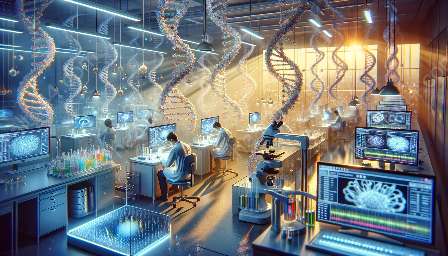Understanding the intricate relationships between bioinformatics, computational genetics, genetics, health education, and medical training is crucial in today's ever-evolving world of science. This article aims to shed light on the fascinating field of bioinformatics and computational genetics and the crucial role they play in advancing our understanding of genetics and their impact on health education and medical practice.
The Emergence of Bioinformatics and Computational Genetics
As the study of genetics has advanced, the need for effective ways to manage and analyze the vast amounts of biological data has become increasingly important. This has led to the emergence of bioinformatics and computational genetics as essential disciplines at the intersection of biology, computer science, and statistics. Bioinformatics involves the development and application of computational tools to better understand biological data, while computational genetics focuses on using computational and statistical approaches to address genetic questions and challenges.
Applications in Genetics
The field of bioinformatics and computational genetics has revolutionized genetics research by providing powerful tools for analyzing genomic and genetic data. These tools have enabled scientists to identify genetic variations, understand gene functions, and explore the genetic basis of diseases. Moreover, bioinformatics and computational genetics play a crucial role in the field of pharmacogenomics, which involves studying how genetic variations influence individual responses to medications.
Impact on Health Education
The insights gained from bioinformatics and computational genetics have far-reaching implications for health education. By understanding the genetic factors underlying various health conditions, educators can tailor health education programs to inform individuals about their genetic predispositions and empower them to make informed decisions about their health. Additionally, advancements in bioinformatics and computational genetics have contributed to the development of personalized medicine, where treatments are customized based on an individual's genetic makeup.
Integration into Medical Training
Medical training programs have increasingly incorporated bioinformatics and computational genetics into their curriculum to better prepare future healthcare professionals. By providing medical students with a solid foundation in these disciplines, educators aim to equip them with the knowledge and skills needed to interpret genetic data, understand the implications for patient care, and stay abreast of the latest developments in genomic medicine.
Challenges and Future Directions
Despite the remarkable progress made in the field of bioinformatics and computational genetics, several challenges persist. These include the need for more robust algorithms, better data integration methods, and improved ways to interpret complex genetic interactions. However, ongoing advancements in artificial intelligence, machine learning, and data visualization offer promising avenues for addressing these challenges and driving the field forward.
Looking ahead, it is clear that bioinformatics and computational genetics will continue to play pivotal roles in genetics, health education, and medical training. By harnessing the power of data analysis and computational tools, researchers, educators, and healthcare professionals can unlock deeper insights into the genetic underpinnings of health and disease, ultimately transforming the way we approach personalized medicine and healthcare delivery.


